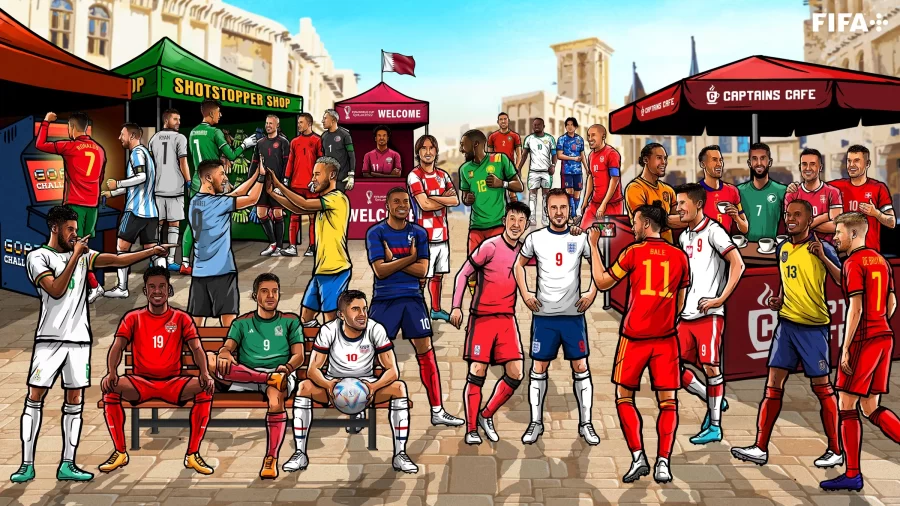Their Country, Their Rules
The decision to award Qatar the right to host the 2022 FIFA World Cup (WC) was met with a variety of concerns and controversy. Several media outlets have criticized Qatar’s history of human rights violations, Qatar’s short football history, the high estimated cost, the local climate, and bribery in the bidding process.
Human rights in Qatar were criticized for how they treated migrant workers, women, and LGBT people, which would lead to claims of sportswashing. Sporthwashing is a form of propaganda that countries use to improve their reputation tarnished by wrongdoing. Others have mentioned the harsh weather in Qatar, the country’s weak football culture, proof of bribes for hosting rights, and overall FIFA corruption. Several nations, clubs, players, and celebrities announced their boycotts of the event. Former FIFA President Sepp Blatter has called awarding Qatar the hosting rights a “mistake” on two separate occasions.
The most discussed issue of the 2022 WC is the treatment of their workers hired to build the 8 new stadiums, built specifically for the WC. The Human Rights Watch, a non-governmental organization in New York, states that the kafala system leaves migrant workers vulnerable to exploitation. Workers could not change jobs or even leave the country without permission from an employer. Over the years of construction, thousands of migrant workers lost their lives and Qatar is not allowing the families to have proper funerals. Because of this, the European Parliament adopted a resolution requesting FIFA to help compensate the families of the migrant workers who died in Qatar.
Furthermore, with the boycotting of LGBT community, a lot of attention has been drawn to the rights of LGBT fans in Qatar. Homosexuality is illegal in Qatar, punishable by the death penalty. FIFA President Sepp Blatter initially said: “I would say they should refrain from any sexual activities”; he later added that: “we [FIFA] don’t want any discrimination. What we want to do is open this game to everybody, and to open it to all cultures, and this is what we are doing in 2022.” On several occasions the Qatari organizers have promised to comply with FIFA rules on promoting tolerance, including LGBT issues.
Shortly after the tournament started this changed. There has been a lot of uprising from other countries (ie. England, Germany, Denmark, Switzerland) fighting these laws in Qatar. Fans from all over the world refused to attend the WC to show their support to the community. Americans, and other countries, have claimed the right to be able to love who they want. As fans come to watch and celebrate their country in the WC, the standards of the host country still need to be respected.
As the World Cup usually occurs during the northern hemisphere’s summer, the weather in Qatar was a concern with temperatures reaching more than 122 °F. Doctors gave a review in November 2010 that said the climate would be an issue and would “affect performance levels from a health point of view of professional athletes.” Because of this, the FIFA executive committee changed the tournament into a winter event instead of a summer one. Even with this change, temperatures in Qatar are still fairly high, resting at about 80°F.
With this in mind, as Qatar built 8 brand new stadiums, the oil-rich nation spent approximately US$220 billion on the 2022 World Cup (this price is 60 times more than what was spent to host the WC in 2010). Nicola Ritter, a German legal and financial analyst, explained to investors that to build the stadiums, about $131 billion was spent with an additional $36 billion for air conditioning in the stadiums. She explained that the rest of the money was spent creating a new luxury city that surrounded the stadium hosting the opening and final match.
In the end, the real question is if Qatar was the right country to hold the WC? Qatar put in a massive amount of money and effort to host the tournament since they won the bid in 2010. Since then, there have been massive social issues, pandemics, and a large overall change that Qatar was unprepared for. This WC has definitely made a statement on how far countries will go to host this worldwide tournament. After everything, Qatar brought a lot of problems to light by hosting the world cup, but in the end, they won the bid, and it is their country. Even though we may not like it, it is their country, so it is their rules.








